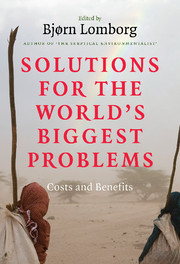Book contents
- Frontmatter
- Contents
- List of figures
- List of tables
- List of contributors
- Acknowledgements
- Introduction
- Part I Economy
- Part II Environment
- Part III Governance
- Part IV Health and population
- 16 Drugs
- 17 Disease control
- 18 Lack of people of working age
- 19 Living conditions of children
- 20 Living conditions of women
- 21 Hunger and malnutrition
- 22 Unsafe water and lack of sanitation
- 23 Population: migration
- Conclusion: Making your own prioritization
16 - Drugs
Published online by Cambridge University Press: 08 July 2009
- Frontmatter
- Contents
- List of figures
- List of tables
- List of contributors
- Acknowledgements
- Introduction
- Part I Economy
- Part II Environment
- Part III Governance
- Part IV Health and population
- 16 Drugs
- 17 Disease control
- 18 Lack of people of working age
- 19 Living conditions of children
- 20 Living conditions of women
- 21 Hunger and malnutrition
- 22 Unsafe water and lack of sanitation
- 23 Population: migration
- Conclusion: Making your own prioritization
Summary
The challenge of illicit drugs
The challenge of illicit drugs is to balance the negatives of drug use against the negatives of policies that attempt to reduce drug use. Drug use can reduce health and productivity. Drug use can cause traffic and industrial accidents, harm unborn fetuses, and diminish the public purse if drug users make excessive use of government-funded health care. Policies that attempt to reduce drug use, however, have their own costs. These include: black markets, violence, corruption, unwarranted restrictions on use of drugs as medicine, excessive restrictions on civil liberties, aiding terrorism, the increased spread of HIV, enriching criminals, diminished respect for the law, and the direct costs of enforcing these policies. The question is therefore which policy achieves the best balancing of costs and benefits?
The solution
The solution proposed here is to legalize the production, sale, distribution and possession of all illicit drugs. A legalized regime might include a number of auxiliary policies that currently apply to alcohol and tobacco, such as driving-under-the-influence laws, sin taxation, age restrictions, subsidized treatment, advertising restrictions, and the like. The analysis here takes no stand on these auxiliary policies; the conclusions hold under any reasonable set of auxiliary policies so long as these occur in a regime where drugs are legal and not subject to regulation or taxation that drives the market underground.
An analysis of prohibition versus legalization
To assess legalization relative to prohibition I first review prohibition's impacts on drug users, non-users, and society generally.
- Type
- Chapter
- Information
- Solutions for the World's Biggest ProblemsCosts and Benefits, pp. 283 - 294Publisher: Cambridge University PressPrint publication year: 2007



